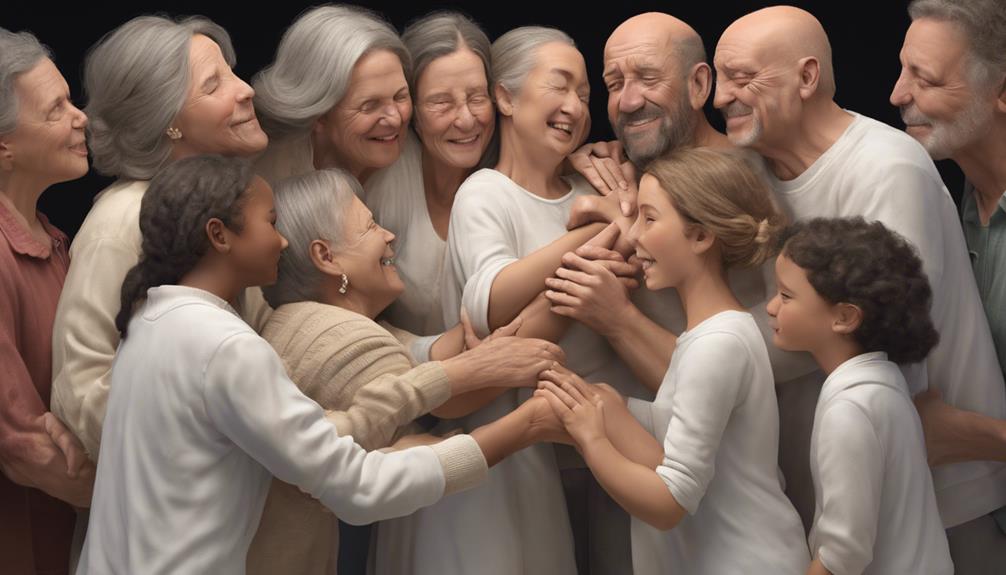Caregiver Support
How to Handle Grief: Navigating Practical Steps
Wade through the complexities of grief with practical steps and insights to guide you towards healing and growth.

Dealing with grief involves recognizing stages like denial and anger. Each person grieves differently, and there's no set timetable for the process. Grief can trigger physical symptoms like fatigue and emotional responses such as sadness or guilt. Coping strategies like acknowledging emotions and seeking support are essential. Remember, honoring the significance of loss and moving forward are pivotal steps. To learn more about understanding practical grief steps, explore further into understanding, manifestations, coping strategies, and embracing healing and growth.
Key Takeaways
- Acknowledge and accept a range of emotions without judgment.
- Seek support from friends, family, or a grief counselor.
- Prioritize self-care through activities like exercise and meditation.
- Implement practical coping strategies to process feelings.
- Allow for the experience of different emotions to aid in healing.
Understanding the Grieving Process
Understanding the grieving process is vital for navigating the complex emotions and stages that follow a significant loss. Grief is a natural response to loss, and it often involves various stages such as denial, anger, bargaining, depression, and acceptance, as described by Elisabeth Kübler-Ross.
Each individual experiences grief uniquely, and there's no fixed timetable for completing the process. It's essential to acknowledge that children and adults may express grief differently, and the stages of grief may not always occur in a predictable order.
Recognizing Different Manifestations of Grief

Recognizing different manifestations of grief involves understanding the types of grief one may experience. This includes physical reactions like fatigue and aches, as well as emotional responses such as sadness and anger.
Types of Grief
Different types of grief present unique challenges and manifestations, including anticipatory grief, disenfranchised grief, and complicated grief.
Anticipatory grief is felt before an actual loss, often by those expecting the death of a loved one.
Disenfranchised grief occurs when a person's mourning isn't openly recognized, like in cases of pet loss or miscarriages.
Complicated grief involves intense, prolonged symptoms that can disrupt daily life, sometimes necessitating professional help.
Recognizing these specific types of grief can help individuals understand their emotions better and seek appropriate support.
It's essential to acknowledge the differences in how grief can manifest to provide the right kind of assistance to those experiencing it. Remember, offering support and guidance are practical steps in helping others navigate through their grief.
Physical Reactions
Experiencing grief can trigger a range of physical reactions that may include fatigue, changes in appetite, body aches, and lowered immunity. Along with these symptoms, grief can also manifest as nausea, weight changes, and sleep disturbances.
Recognizing these physical expressions is vital for thorough healing and self-care. Understanding that grief affects both the body and mind is essential for managing symptoms effectively.
Coping with physical expressions of grief involves prioritizing self-care practices like proper nutrition, exercise, and rest. By taking care of our bodies during times of grief, we can help alleviate some of the physical burdens that accompany the grieving process.
Emotional Responses
Traversing the emotional landscape of grief involves acknowledging the varied ways in which our feelings can manifest. Grief can evoke shock, sadness, guilt, fear, and anger at different intensities and durations.
These emotional responses may also lead to physical symptoms such as fatigue, nausea, changes in appetite, lowered immunity, and body aches. Individuals dealing with grief may experience emotional numbness, intense waves of sadness, feelings of emptiness, or a sense of disbelief and confusion.
Furthermore, grief can trigger loneliness, anxiety, irritability, difficulty concentrating, and overwhelming emotional pain. Understanding and recognizing these diverse emotional responses is essential for effectively managing the grieving process.
Seeking appropriate support during these challenging times can provide comfort and guidance in handling the complex emotions that accompany grief.
Honoring the Significance of Loss

When we talk about honoring the significance of loss, we're acknowledging the deep emotional pain that comes with it.
It's important to recognize the lasting impact that the person or thing that was lost had on our lives.
Taking steps to commemorate this significance through rituals, traditions, or supporting causes can help us navigate through the process of grieving.
Acknowledging Deep Emotional Pain
Recognizing the profound emotional pain following a significant loss is essential for honoring its significance and embracing the grieving process. It involves allowing oneself to feel the intense grief that accompanies a significant loss, such as the passing of a loved one. By acknowledging this deep emotional pain, individuals can begin to navigate the healing process and move towards acceptance. To emphasize the importance of acknowledging deep emotional pain, consider the following table:
| Key Points | Description | Outcome |
|---|---|---|
| Acknowledging | Recognizing and accepting deep emotional pain | Integration of feelings |
| Allowing feelings | Permitting oneself to feel intense grief | Progress in healing |
| Moving towards acceptance | Embracing the grieving process | Finding peace |
Honoring the significance of loss through acknowledging deep emotional pain is a pivotal step in the journey of grief.
Recognizing Lasting Impact
Reflecting on the lasting impact of a significant loss is essential in integrating the experience into our personal growth journey. When we acknowledge the impact of grief and loss, we take important steps towards healing and moving forward.
Understanding the enduring impact of our emotions can help us navigate through the memories associated with the loss. By recognizing the significance of the loss, we validate the relationship or experience that was so meaningful to us.
This process of acknowledging the impact of loss is vital for our personal growth journey, helping us honor the significance of what we've gone through and guiding us towards healing and acceptance.
Integrating Grief Into Daily Life

To integrate grief into daily life, consider incorporating the memory of your loved one into your everyday routines and activities. By keeping their presence alive in your daily life, you can find solace in memories and honor their legacy. Creating rituals or traditions that pay tribute to the deceased, like lighting a candle, visiting a special place, or sharing stories, can help you feel connected to them. Reminders such as photos, keepsakes, or journals can serve as touchstones to maintain your connection with the person you've lost. Seeking support from friends, family, or support groups is essential in assimilating the integration of grief into your daily life. Remember to allow yourself to experience a range of emotions as you go about your routines, understanding that grief is a natural part of healing and coping.
| Ideas for Integrating Grief Into Daily Life | ||
|---|---|---|
| Incorporate memory into daily routines | Create rituals or traditions to honor the deceased | Utilize reminders like photos or keepsakes |
Seeking Support From Loved Ones

Incorporating grief into our daily lives can be made more manageable by seeking support from loved ones during the grieving process. When going through a tough time, having a strong support system can make all the difference. Here are some ways your loved ones can provide the help you need:
- Offering Emotional Support: Loved ones can provide a listening ear, empathy, and understanding to help you navigate through your grief. Expressing your feelings to them can offer comfort and emotional relief.
- Assisting with Daily Tasks: Family and friends can lend a helping hand with daily chores, provide companionship, and offer practical support. These gestures can ease your burden and allow you to focus on coping with your loss.
- Creating a Support Network: Building a support network of caring individuals can help you feel less isolated and more connected. It offers a sense of community, belonging, and understanding, which are critical for coping with grief.
Consulting Mental Health Professionals

When moving through the grieving process, reaching out to mental health professionals can provide tailored support and strategies to help cope with complex emotions and challenges. Consulting mental health professionals such as psychologists, therapists, and grief counselors can offer personalized strategies and interventions to assist in maneuvering the stages of grief.
These professionals create a safe space for individuals to express their feelings, process their grief, and develop coping mechanisms suited to their unique needs. By seeking help from mental health professionals, one can gain insights into managing symptoms, fostering healing, and understanding the journey towards acceptance and healing after a loss.
These professionals play an essential role in providing guidance, support, and tools for coping with grief. Their expertise can be instrumental in offering the necessary support to navigate through the difficult emotions and challenges that arise during the grieving process.
Coping Strategies for Grief

Traversing the complex emotions of grief involves implementing practical coping strategies that can help individuals process their feelings and find ways to heal and move forward. During this challenging time, it's essential to utilize various techniques to navigate through emotional pain.
- Acknowledge Your Emotions: Allow yourself to feel and express your emotions. It's okay to grieve and experience the range of feelings that come with loss.
- Seek Support: Reach out to friends, family, or a grief counselor. Talking about your feelings and receiving support can help you cope with grief.
- Prioritize Self-Care: Take care of your physical health by getting enough rest, eating well, and engaging in self-care activities like exercise or meditation. Self-care is vital in managing grief and promoting healing.
Importance of Self-Care Practices

When grieving, it's important to prioritize self-care practices to help us heal and cope with our loss. Engaging in routines, getting enough sleep, and staying physically active can boost our mood and energy levels during this challenging time.
Mindfulness and relaxation techniques, along with proper nutrition, play essential roles in supporting our emotional and physical well-being as we navigate through grief.
Self-Care for Healing
Engaging in regular self-care practices is essential for promoting healing and overall well-being during the grieving process. Here are three key self-care activities to aid in your journey of grief navigation:
- Healthy Eating: Consuming nutritious foods fuels your body and mind, enhancing resilience and mental health.
- Exercise: Physical activity releases endorphins, boosting mood and reducing stress, essential for emotional regulation.
- Mindfulness: Practicing mindfulness techniques, like deep breathing or meditation, fosters relaxation and coping abilities in challenging times.
Coping With Loss
Prioritizing self-care practices is essential for individuals coping with loss, aiding in maintaining their physical and emotional well-being during the grieving process. Engaging in self-care activities like mindfulness, relaxation techniques, and physical exercises can greatly improve mood, reduce stress, and support overall mental health. These practices play an important role in promoting healing, resilience, and emotional stability amidst the challenges of grief. Taking time for self-care allows moments of respite, comfort, and rejuvenation during the emotional turmoil of loss. Here's a table highlighting various self-care practices that can help individuals cope with grief:
| Self-Care Practice | Benefits |
|---|---|
| Mindfulness | Reduces stress, enhances emotional well-being |
| Relaxation Techniques | Calms the mind, promotes relaxation |
| Physical Activities | Improves mood, boosts physical health |
| Healthy Eating | Provides energy, supports overall well-being |
Moving Forward After Loss

After experiencing a significant loss, integrating it into our lives while honoring its significance is essential for moving forward. It's normal to feel intense emotions about a loss as part of the grieving process, even years later.
Here are three practical steps to help navigate moving forward after loss:
- Honoring the memory: Find ways to commemorate the life of the one we lost, such as creating a memory book or dedicating a special day to them. This can help keep their memory alive while also providing comfort in the grieving process.
- Finding ways to live: Explore new hobbies, volunteer work, or support groups to help fill the void left by the loss. Engaging in activities that bring joy and purpose can aid in the healing process and provide a sense of moving forward.
- Embracing growth: Understand that while the loss shapes us, it doesn't define us. Allow yourself to grow from the experience, finding strength and resilience in the face of adversity. This growth can lead to healing and a renewed sense of purpose in life.
Embracing Healing and Growth

Healing and growth through grief involve accepting the reality of loss and allowing ourselves to experience a range of emotions without judgment. By finding meaning in our pain, learning to live with the absence, and integrating the experience into our lives, we can gradually adjust to a new normal. Seeking support from others and engaging in self-care practices are crucial steps in this journey of healing. It's important to acknowledge the pain of grief while recognizing the potential for personal transformation and positive change.
| Key Steps | Description | Importance |
|---|---|---|
| Accepting loss | Acknowledge the reality of the loss without denying it to begin the healing process. | Fundamental step |
| Experiencing emotions | Allow yourself to feel a range of emotions, from sadness to anger, without judging or suppressing them. | Promotes emotional well-being |
| Seeking support | Connect with friends, family, or a therapist to share your feelings and receive comfort and guidance. | Provides emotional assistance |
| Self-care practices | Engage in activities that nurture your physical, emotional, and mental well-being, such as exercise or journaling. | Promotes overall wellness |
| Adjusting to new normal | Gradually adapt to a life without your loved one, finding ways to honor their memory while moving forward. | Facilitates the healing process |
Frequently Asked Questions
What Are the 3 C's of Grief?
We grasp the 3 C's of grief: 'cause,' 'control,' and 'cure.' They assist us in recognizing triggers, handling responses, and embracing healing gradually. By acknowledging these facets, we can navigate the intricacies of grief with compassion and resilience.
What Is One of the Best Ways to Effectively Deal With Grief?
Acknowledging our emotions fully is essential in dealing with grief. It's okay to feel all the ups and downs. Mindfulness practices help us process emotions. Talking to someone we trust and journaling are important too.
What Not to Do When Grieving?
When grieving, we should avoid suppressing emotions, isolating ourselves completely, rushing the process, making major decisions impulsively, and comparing our grief to others. Each journey is unique; seeking support and giving ourselves time is essential.
What Are the 5 Stages a Person Must Move Through in Regards to Coping With Loss and the Grieving Process?
We believe in acknowledging the 5 stages of grief: denial, anger, bargaining, depression, and acceptance. These stages vary for each person and may not follow a specific order. Understanding them helps navigate the emotional journey of loss.
Conclusion
To sum up, it's important to remember that grief is a natural and necessary process. By recognizing the different manifestations of grief, honoring the significance of loss, seeking support from loved ones, and practicing coping strategies and self-care, we can navigate through our grief in a healthy way.
Moving forward after loss may be challenging, but embracing healing and growth can lead to a sense of peace and resilience in the face of adversity.
Albert brings a wealth of knowledge and expertise to our writing team. With a background in caregiving and a deep understanding of the challenges faced by caregivers, Albert’s writing resonates with authenticity and empathy. He is committed to delivering high-quality content that empowers and supports caregivers on their journey.
Caregiver Support
What Are the Real Stages of Grief and Loss Like?
Journey through the real stages of grief and loss to uncover the intricate emotions and complexities that shape our process of healing.

The stages of grief and loss are best understood through denial, anger, bargaining, depression, and acceptance, a framework by Elisabeth Kübler-Ross, although not always in that order. Denial shields us from the impact of loss, while anger may bring forth frustration and blame. Bargaining involves seeking alternatives to alleviate pain, and depression manifests as intense sadness and hopelessness. Finally, acceptance leads to peace and adjustment. Each person experiences these stages uniquely, influenced by personal and external factors that shape their journey of healing. Further insights can shed light on the complexities of this process.
Key Takeaways
- Grief stages vary in duration and intensity for each individual.
- The stages of grief may not unfold in a predictable or linear order.
- Emotional and physical manifestations can accompany the grieving process.
- People can fluctuate between different stages of grief.
- Each person's experience of grief is unique and influenced by personal and external factors.
Overview of Grief Stages
In understanding the stages of grief, we navigate the complex emotional journey of loss and healing. Elisabeth Kübler-Ross identified five stages of grief: denial, anger, bargaining, depression, and acceptance. These stages serve as a framework for comprehending the array of emotions that accompany loss. It's important to recognize that the stages of grief may not unfold in a linear order for everyone; individuals might oscillate between different stages or experience them simultaneously.
Denial, the initial stage, often involves shock and disbelief, acting as a buffer against the intense emotions of loss. Anger may follow, as feelings of frustration and helplessness surface. Bargaining then emerges, as individuals seek ways to regain control or make sense of the situation. Subsequently, depression sets in, bringing overwhelming sadness and a sense of isolation. Finally, acceptance allows for healing and moving forward while honoring the memory of what was lost.
Throughout these stages, support from loved ones and validation of one's feelings are essential. Seeking out professional help or joining support groups can also provide guidance and comfort during the grieving process.
Understanding Denial

Refusing to acknowledge the reality of loss, denial in grief often manifests as a protective shield against overwhelming emotions. During the Denial Stage, individuals may find themselves refusing to accept the harsh Reality of the Loss, leading to a state of Numbness and Disbelief.
To cope, some may minimize the Impact of the Loss, attempting to maintain a facade of normalcy. This defense mechanism may also result in a Significance of Presence or even Hallucinations of the Deceased, complicating the grieving process further.
It's essential to understand that denial is a common reaction to loss, serving as a way to gradually come to terms with the heartbreaking news. By recognizing and acknowledging these feelings, one can begin to navigate through the complex emotions that arise during the grieving process.
Navigating Anger
During the grieving process, managing anger involves acknowledging and processing intense emotions to aid in emotional healing and progression. Anger is an important stage of grief where individuals may experience feelings of blame and resentment towards various aspects of the situation. It's natural to feel anger towards the deceased, oneself, or even higher powers during this time. Expressing anger can serve as a beneficial outlet for these intense emotions and can help in moving through the grief stage effectively.
When dealing with anger in grief, it may manifest as irritability, frustration, or even outbursts of rage. It's vital to recognize and process these emotions to facilitate emotional healing and progression through the stages of grief. By acknowledging and addressing anger in a constructive manner, individuals can navigate this challenging stage more effectively, allowing for a healthier grieving process overall. Remember, it's okay to feel angry, but finding healthy ways to express and process this anger is key to moving forward.
Exploring Bargaining

As we explore the stage of bargaining in the grieving process, individuals often find themselves seeking ways to negotiate with their emotions and the reality of their loss. During this phase, people may engage in a series of internal dialogues, attempting to strike deals either with themselves or a higher power to alleviate their pain and change the outcome of the loss. This stage is characterized by:
- Going over past events and asking 'what if' questions, trying to find ways to feel better or reverse the loss.
- Making promises or commitments in exchange for relief from grief, reflecting a desire to regain control over the situation.
- Engaging in a quest for meaning in the loss, intertwined with feelings of guilt or regret.
Bargaining is a natural part of the grieving process, where individuals grapple with their emotions and attempt to navigate the difficult reality they're facing. By acknowledging and understanding this stage, one can begin to address the underlying emotions and work towards eventual healing.
Dealing With Depression
When dealing with depression during grief, it's important to understand the depressive symptoms that may arise.
Seeking professional help, such as from counselors or therapists, can provide valuable support and guidance.
Implementing coping strategies for depression is vital for getting through this challenging time.
Understanding Depressive Symptoms
Experiencing intense sadness, hopelessness, and feelings of emptiness are common signs of depressive symptoms during grief. When grappling with these feelings, it's important to comprehend the impact they can have on daily life. Here are key aspects to ponder:
- Changes in sleep patterns, appetite, and energy levels can disrupt your routine and overall well-being.
- Social withdrawal may lead to isolation, making it harder to seek support from loved ones.
- Feelings of worthlessness can affect your self-esteem and hinder your ability to engage in activities you once enjoyed.
Recognizing these symptoms is the first step towards managing them effectively. Seeking professional help is essential in getting through this challenging period.
Seeking Professional Help
How can seeking professional help benefit individuals dealing with depression during grief? Mental health counselors or therapists play an essential role in providing support and guidance for those experiencing grief-related depression. They assist in identifying coping strategies and developing personalized plans to address depressive symptoms effectively. Therapeutic interventions, such as cognitive-behavioral therapy (CBT), can help individuals process grief and alleviate depressive symptoms. Consulting a mental health professional early on can prevent prolonged or complicated grief by addressing depression during the grieving process. Here is a table summarizing the benefits of seeking professional help for depression during grief:
| Benefits of Seeking Professional Help |
|---|
| Provides support and guidance |
| Assists in identifying coping strategies |
| Develops personalized plans for addressing symptoms |
| Utilizes therapeutic interventions like CBT |
Coping Strategies for Depression
Exploring various coping strategies is vital for effectively managing depression during periods of grief. When dealing with depression, it's essential to contemplate the following strategies:
- Seeking professional help from therapists or counselors can provide valuable support and guidance in navigating your emotions.
- Engaging in regular physical activity, such as daily walks or yoga, can help alleviate symptoms of depression by boosting endorphins.
- Developing a routine and setting achievable goals can offer a sense of purpose and structure, helping you stay motivated and focused during difficult times.
Embracing Acceptance

When it comes to embracing acceptance in grief, it's essential to acknowledge the reality of our loss gracefully.
Finding peace within ourselves is a key step towards integrating the absence of our loved one into our lives.
Acknowledging Reality Gracefully
Gradually easing emotional pain and coming to terms with the reality of the loss is a pivotal step in the process of grief and healing. Acceptance involves learning to live with the absence of the loved one while keeping their memories close. It allows for finding new meaning in life and embracing healing after loss.
To acknowledge reality gracefully, one must face the permanence of the loss, allowing space for the pain without denying it. By adjusting to this changed reality, one can start to move forward, feeling a sense of peace and rightness in life despite the absence of the loved one.
Finding Peace Within
Embracing acceptance in grief allows us to find inner peace and begin the journey towards healing and growth. Adjusting to a new reality can be challenging, but it is an essential step in moving forward. By acknowledging our emotional pain and gradually learning to live with the loss, we pave the way for healing. Keeping memories of the deceased close to our hearts helps us cherish the past while looking towards the future. Acceptance is a milestone in the grief process, signifying that we are ready to embrace a new chapter in our lives. Below is a table highlighting the importance of acceptance in finding peace within:
| Key Points |
|---|
| Easing emotional pain |
| Adjusting to a new reality |
| Keeping memories alive |
| Moving forward with plans |
| Marking a milestone in healing and growth |
Progression of Grief Stages

Exploring the progression of grief stages involves a complex emotional journey that varies for each individual. As individuals progress through the real stages of grief, they may experience a mix of emotions and reactions, influenced by a variety of factors. Here are some key points to ponder regarding the progression of grief stages:
- Grief stages may not occur in a linear fashion, allowing individuals to revisit or skip stages based on their unique experiences.
- The duration of each grief stage varies for individuals, with some stages lasting longer than others depending on personal coping mechanisms.
- People may fluctuate between different stages of grief, experiencing a mix of emotions and reactions at different times during the grieving process.
Understanding these aspects of the progression of grief stages can help individuals navigate their own journey through grief with awareness and insight. It's essential to recognize that each person's experience is unique and influenced by a variety of personal and external factors.
Duration and Impact of Grief Stages

Understanding the diverse durations and impacts of grief stages is essential for effectively supporting individuals experiencing loss. Grief stages can vary greatly in duration, ranging from weeks to years, with no fixed timetable for each stage. The impact of these stages differs for each individual, influencing their emotional processing and healing journey.
It's important to recognize that grieving stages may not unfold in a linear order, allowing for flexibility in emotional responses. Emotional processing during these stages can also have physical manifestations, such as changes in sleep patterns and energy levels.
Frequently Asked Questions
What Is the Hardest Grief?
The most important grief stage varies among individuals. Some struggle most with denial, while others find anger or depression more challenging.
Bargaining can be tough for those feeling regret or helplessness. Acceptance may be most challenging for those needing to embrace the reality of loss and move forward.
Recognize that the most critical stage can change over time, requiring different support and coping strategies. It's essential to understand and navigate these emotions with care and patience.
What Are 6 Symptoms of Complicated Grieving?
When dealing with complicated grief, six symptoms to watch for include:
- persistent feelings of emptiness,
- difficulty trusting others,
- an inability to engage in enjoyable activities,
- persistent thoughts of the deceased,
- physical symptoms like fatigue, headaches, and stomach issues.
These signs can hinder daily functioning and overall well-being.
Seeking support from loved ones or professionals can help navigate these challenging emotions and begin the healing process.
What Not to Do When Grieving?
When grieving, we must avoid minimizing the loss, offering unsolicited advice, rushing the process, dismissing feelings, or pressuring the individual to move on.
It's vital to provide support, listen actively, and validate emotions. By being present, empathetic, and patient, we can help those grieving navigate their emotions in a healthy way.
It's imperative to respect their unique grieving journey and offer a compassionate presence without judgment or imposition.
What 7% of Bereaved People Might Experience Complicated Grief?
Approximately 7% of bereaved individuals may experience complicated grief, marked by intense emotions and difficulties in managing loss. Symptoms include yearning for the deceased, avoiding reminders of the loss, and bitterness towards the death.
Those with complicated grief may feel empty, struggle to trust, and detach from reality. Seeking professional help and support groups can aid in handling these complex emotions and fostering healing.
Conclusion
To sum up, the stages of grief and loss can be a challenging journey, but understanding and maneuvering through them can lead to healing and growth.
Remember, it's normal to experience a range of emotions during this process. By allowing ourselves to feel and process these emotions, we can eventually reach a place of acceptance and peace.
So, embrace the journey with courage and resilience, knowing that you'll emerge stronger on the other side.
Albert brings a wealth of knowledge and expertise to our writing team. With a background in caregiving and a deep understanding of the challenges faced by caregivers, Albert’s writing resonates with authenticity and empathy. He is committed to delivering high-quality content that empowers and supports caregivers on their journey.
Caregiver Support
Embracing Aging: 7 Steps to Growing Older Fabulously
Fulfill your desire for a vibrant aging process with 7 empowering steps, starting with a positive mindset." Keep reading to discover the key to aging fabulously!

Let's age fabulously with 7 key steps! To start, maintain a positive mindset for longevity. Then, prioritize self-care like exercise and healthy eating. Keep socially connected by engaging with others. Lifelong learning is essential for cognitive function. Physical activity boosts health and mood. Nurture emotional well-being by finding passions. Finally, inner fulfillment comes from reflecting on values and serving others. These steps support a vibrant aging process for a fulfilling life ahead.
Key Takeaways
- Maintain a positive mindset for healthy aging and reduced risks.
- Practice self-care through exercise, balanced diet, and stress relief.
- Foster social connections to combat loneliness and promote mental health.
- Engage in lifelong learning to enhance cognitive function and well-being.
- Stay physically active to improve mobility, mood, and overall health.
Cultivate a Positive Mindset
Cultivating a positive mindset greatly decreases the risk of early death among older adults by 44%. Aging gracefully involves nurturing a positive outlook on life. When we choose to see the good in every situation, we aren't only benefiting our mental health but also our physical well-being.
Studies have shown that maintaining a positive mindset can lead to a 50% reduction in the risk of developing dementia. Additionally, a positive attitude can lower the chances of heart disease by 13% in older individuals. By focusing on the good and embracing positivity, we can also decrease the likelihood of experiencing a stroke by 55%.
Moreover, positive emotions play a significant role in reducing the risk of frailty and disability by 23% in older age. Embracing a positive mindset is a powerful tool in our journey towards aging fabulously. Let's endeavor to cultivate positivity in our thoughts and actions to live a fulfilling and healthy life.
Prioritize Self-Care Routines

Incorporating self-care routines into our daily lives is essential for promoting healthy aging and overall well-being. As we navigate the aging process, prioritizing self-care becomes increasingly important. Establishing a consistent skincare routine can help maintain skin health and vitality as we grow older. Regular exercise and a balanced diet play important roles in contributing to our overall well-being and promoting graceful aging. Additionally, incorporating stress-relieving activities like meditation or yoga can support our mental and emotional health throughout the aging process.
Ensuring proper hydration and getting an adequate amount of sleep are also essential aspects of self-care routines for healthy aging. Hydration helps maintain bodily functions and skin elasticity, while quality sleep supports cognitive function and overall well-being. Additionally, seeking regular medical check-ups and screenings can aid in the early detection and management of age-related health issues, contributing to our well-being as we embrace the aging process. Prioritizing self-care routines is a proactive way to care for ourselves and age fabulously.
Stay Socially Connected
How can we guarantee we maintain strong social connections as we age?
As older adults, staying socially connected is crucial for our overall well-being. One way to achieve this is by actively engaging with others through social media platforms. Social media allows us to connect with friends, family, and even new acquaintances, fostering relationships and combating feelings of loneliness. By participating in online communities, sharing experiences, and keeping in touch with loved ones, we can strengthen our social networks and stay connected despite physical distances.
Moreover, social media provides an avenue for older adults to engage in discussions, share memories, and even learn new things. It offers a platform for continuous interaction and communication, contributing to cognitive stimulation and mental sharpness. Embracing social media as a tool for staying socially connected can help reduce the risk of cognitive decline, dementia, depression, and anxiety, ultimately promoting a healthier and happier aging process for all of us.
Let's embrace the benefits of social media and maintain our social connections as we age fabulously.
Engage in Lifelong Learning

As we embrace the benefits of social media for maintaining strong social connections in our older years, moving into engaging in lifelong learning becomes a natural progression towards enhancing cognitive function and overall well-being. Lifelong learning plays an important role in aging gracefully and joyfully. Here are some key points to ponder:
- Cognitive Enhancement: Engaging in educational activities can help maintain memory and cognitive abilities, keeping our minds sharp and agile.
- Fulfilling Aging Process: Learning new skills and knowledge contributes to a fulfilling and joyful aging process, providing a sense of accomplishment and satisfaction.
- Social Engagement: Lifelong learning is linked to increased social engagement, fostering connections with others and a sense of belonging.
- Vibrant Lifestyle: Taking up new hobbies or pursuing further education leads to a more vibrant and active lifestyle, promoting physical and mental well-being in aging individuals.
Embracing lifelong learning is a wonderful way to continue growing and evolving as we age, enriching our lives and those around us.
Embrace Physical Activity
Let's prioritize our physical well-being by embracing regular physical activity as a key component of healthy aging. As we grow older, engaging in activities like walking, swimming, or yoga can have immense health benefits. Regular physical activity can improve balance, flexibility, and overall mobility in older adults. It also helps in maintaining muscle mass and bone density through strength training exercises.
By staying active, we can reduce the risk of chronic conditions such as heart disease, diabetes, and osteoporosis.
Moreover, exercise plays an essential role in boosting our mood and cognitive function, contributing to a higher quality of life as we age. It enhances our physical well-being and vitality, ensuring that we can continue to lead active and fulfilling lives.
Nurture Emotional Well-Being

Caring for our emotional well-being is vital as we age. Here are some tips to help us nurture our emotions and cope with the changes that come with growing older.
These strategies can support our mental health and enhance our overall quality of life.
Emotional Self-Care Tips
Practicing self-compassion and forgiveness enhances emotional well-being and fosters a positive mindset, contributing to a more fulfilling and joyful life. Here are some emotional self-care tips to help us maintain a healthy outlook as we grow older:
- Connect with your inner child: Engage in playful activities and foster creativity to nurture emotional resilience and joy.
- Embrace authenticity: Prioritize inner values over material possessions for greater emotional fulfillment and peace.
- Prioritize joy and laughter: Infuse daily interactions with positivity to boost emotional health and overall vitality.
- Engage in creative expression: Explore artistic pursuits to find fulfillment and rejuvenate emotionally.
Coping With Change
Traversing through life's alterations becomes more manageable when we prioritize nurturing our emotional well-being. As we age, coping with modification is vital for maintaining a positive outlook and inner peace.
Developing resilience and adaptability empowers us to navigate shifts with grace and optimism. Embracing modification as a natural part of life can lead to personal growth and a deep sense of fulfillment in our old age.
Seeking support from loved ones and engaging in self-care practices are essential tools for coping with changing circumstances. It's important to acknowledge and process our emotions related to modification, allowing us to embrace our natural beauty and find joy in the journey of aging gracefully.
Find Purpose and Passion

As we age, it's important to discover new interests that bring us joy and fulfillment. Cultivating inner satisfaction through engaging activities can greatly enhance our overall well-being.
Finding purpose and passion in our daily lives can lead to a more satisfying and meaningful older age.
Discovering New Interests
Exploring new interests as we age can infuse life with excitement and purpose, enhancing our overall well-being and contributing to a fabulous aging journey. When we discover new hobbies or activities, we open doors to personal growth and fulfillment. Here are some benefits of finding passion in new interests:
- Stimulating the Mind: Engaging in new activities can keep our minds sharp and active.
- Enhancing Well-being: Pursuing interests that excite us can lead to emotional fulfillment and happiness.
- Promoting Personal Growth: Trying new things allows us to learn, grow, and develop new skills.
- Spark of Creativity: Exploring different interests can ignite our creativity and bring a sense of accomplishment.
Cultivating Inner Fulfillment
Cultivating inner fulfillment involves actively seeking out purpose and passion in life to enhance our overall well-being. Discovering activities that align with our values and interests can bring joy and satisfaction, contributing to a more meaningful life. Pursuing hobbies and passions that resonate with us can lead to a sense of fulfillment and happiness. By identifying what truly matters to us and engaging in activities that spark our enthusiasm, we can lead a more purpose-driven life even as the years go by. To help you in this journey, below is a table highlighting ways to cultivate inner fulfillment.
| Ways to Cultivate Inner Fulfillment |
|---|
| Reflect on Personal Values and Interests |
| Explore New Hobbies and Passions |
| Volunteer and Serve Others |
| Set Goals Aligned with Your Passion |
| Practice Gratitude and Mindfulness |
Frequently Asked Questions
How Do You Embrace the Aging Process?
We embrace the aging process by cherishing each moment, staying active, nurturing our minds and bodies, and cultivating a positive outlook. We prioritize self-care, seek wisdom, and value personal growth for a fabulous journey through life.
How Can I Grow Older Gracefully?
We learn to grow older gracefully by embracing change, nurturing our bodies and minds, and cherishing each moment. By practicing self-care, staying connected, and finding joy in simple pleasures, we can age fabulously.
What Three Things Should a Person Avoid Once They Are Past 70 Years Old?
To stay healthy after 70, we should avoid excessive sitting to keep moving, prioritize social connections to stay engaged, and maintain a nutritious diet for overall well-being. Regular health check-ups are key for addressing any concerns promptly.
How Can a Woman Age Beautifully?
We age beautifully by nurturing our skin with antioxidants and SPF, eating well for glowing skin, exercising for muscle tone, embracing our gray hair gracefully, and practicing mindfulness. Like a fine wine, we grow more fabulous with time.
Conclusion
To sum up, embracing aging is crucial for living a fulfilling and fabulous life. Did you know that studies have shown that adults who maintain a positive attitude towards aging live, on average, 7.5 years longer than those with a negative outlook?
By following these 7 steps, you can cultivate a mindset that embraces the beauty of growing older while prioritizing self-care, connection, learning, physical activity, emotional well-being, and finding purpose.
Age is just a number – embrace it with grace and positivity.
Albert brings a wealth of knowledge and expertise to our writing team. With a background in caregiving and a deep understanding of the challenges faced by caregivers, Albert’s writing resonates with authenticity and empathy. He is committed to delivering high-quality content that empowers and supports caregivers on their journey.
Caregiver Support
Signs of Grief and Loss: Seek Help
In times of grief and loss, identifying signs for seeking help is crucial – discover the key to healing.

In times of profound grief and loss, identifying signs for seeking help becomes essential. Behavioral shifts like social withdrawal, appetite changes, and sleep disturbances signal distress. Emotional turmoil shows through sadness, anger, or numbness. Social isolation and losing interest in activities may point to unresolved grief. Pay attention to physical symptoms like body aches or disrupted sleep patterns. Coping difficulties, persistent sadness, or suicidal thoughts should prompt reaching out. Recognizing these signs and getting support are important steps in the healing process. Remember, knowing when to seek help is a key to handling grief effectively.
Key Takeaways
- Recognize signs of complicated grief for timely intervention.
- Engage in familiar activities to aid in coping.
- Seek help from professionals to address complex emotions.
- Acknowledge emotions as a significant step towards healing.
- Tailored interventions can mitigate risks of prolonged grief.
Behavioral Changes
When experiencing grief, individuals may undergo significant behavioral changes that can impact various aspects of their daily lives. Grief often manifests in ways such as social withdrawal, changes in appetite, sleep disturbances, and increased substance use. These behavioral shifts can be challenging to navigate, as they may lead to a sense of isolation and difficulty in maintaining regular routines.
Social withdrawal, a common response to grief, can further exacerbate feelings of loneliness and detachment from support systems. Changes in appetite, whether an increase or decrease, may affect overall physical health and energy levels. Sleep disturbances, such as insomnia or oversleeping, can disrupt daily functioning and contribute to feelings of fatigue and emotional instability. Additionally, increased substance use as a coping mechanism can lead to further complications in managing grief.
During times of grief, recognizing these behavioral changes is essential. Seeking help from mental health professionals can provide valuable support and guidance in coping with these challenges effectively. If these behavioral changes persist and interfere with daily activities, reaching out for assistance is a proactive step towards healing and recovery.
Emotional Distress

Experiencing grief can often lead to a range of intense emotional distress, including feelings of sadness, loneliness, guilt, and anger. It's essential to address these emotions to safeguard mental health and prevent long-term complications. Some individuals in grief may also encounter emotional numbness, struggle with concentration, or feel overwhelmed by their emotions. Mood swings, irritability, and a sense of emptiness are common during the grieving process. Additionally, feelings of worthlessness, hopelessness, and disinterest in once enjoyed activities can emerge, indicating the depth of emotional pain experienced.
To cope with such intense feelings, developing coping skills and seeking treatment is vital. Below is a table emphasizing the importance of addressing emotional distress in grief:
| Importance of Addressing Emotional Distress in Grief |
|---|
| Safeguards mental health |
| Prevents long-term complications |
| Promotes emotional well-being |
Social Withdrawal
Social withdrawal is a common response to grief and loss. Individuals may distance themselves from social interactions and activities, avoiding social gatherings, isolating from friends, and experiencing a loss of interest in previously enjoyed activities. These are key indicators of this withdrawal. Recognizing these signs and offering understanding and support can help individuals navigate through this challenging time.
Such understanding and support can provide comfort and reassurance, helping individuals cope with their emotions and gradually reintegrate into social interactions when they are ready. It is essential to respect the individual's need for space and time to process their grief, while also encouraging them to seek professional help if needed. By being there for them and showing empathy, you can make a significant difference in their healing journey.
Isolating From Friends
Feeling overwhelmed by grief and loss can sometimes lead us to withdraw from our friends, isolating ourselves in the process. Social withdrawal during times of grief is a common response that can make us distance ourselves from our usual support system.
This isolation can intensify feelings of loneliness and sadness, deepening the impact of our loss. Recognizing the signs of isolating from friends is important, as it may indicate a need for professional help to navigate through these challenging emotions.
Reaching out to loved ones or seeking therapy can provide the necessary support to cope with grief and prevent further withdrawal from social interactions. Remember, seeking help is a sign of strength and a crucial step towards healing during times of loss.
Avoiding Social Gatherings
When withdrawing from friends due to grief and loss, avoiding social gatherings can become a common behavior that signals a need for solitude and space to navigate through emotions.
Grieving individuals may feel overwhelmed in social settings and find comfort in solitude as a way of coping with the loss. Avoiding gatherings where the deceased would have been present can be a natural response to the pain of the loss.
It's essential to recognize that social withdrawal can indicate a need for space and time to process emotions related to grief. If social withdrawal persists and interferes with daily functioning, seeking help from a mental health professional is advisable to receive the necessary support and guidance.
Loss of Interest
During times of grief and loss, recognizing social withdrawal as a sign of unresolved grief becomes paramount. Seeking help from friends, family, or a mental health professional can be beneficial for those experiencing social withdrawal due to grief. Addressing this withdrawal and not letting it persist without intervention is of utmost importance. Below is a table summarizing key points related to the loss of interest and social withdrawal in the context of grief and loss:
| Loss of Interest in Social Activities |
|---|
| Common sign of grief and loss |
| Grieving individuals isolate themselves |
| Indicates need for support |
| Recognize as sign of unresolved grief |
| Seek help from friends or professionals |
Physical Symptoms

When experiencing grief, our bodies often react with physical symptoms like body aches, fatigue, and weakness. These signs may manifest as headaches, upset stomach, or muscle pains, affecting our overall well-being.
Understanding how grief can impact us physically is essential in managing our health during difficult times.
Body Aches and Pains
Experiencing body aches and pains is a common physical manifestation of grief and loss. When dealing with the emotional distress of grief, our bodies often respond with physical symptoms like headaches, muscle tension, and overall discomfort.
These body aches can also show up as stomach upset, fatigue, and difficulty sleeping, indicating a deep connection between our emotional and physical well-being.
To address these physical manifestations of grief, seeking support and practicing self-care are important. Engaging in activities that promote relaxation and managing stress can help alleviate body aches and pains associated with grief.
Fatigue and Weakness
Our bodies may exhibit signs of fatigue and weakness as common physical symptoms in response to grief and loss, reflecting the interconnectedness of our emotional and physical well-being. When experiencing grief, feelings of exhaustion and low energy levels can be overwhelming.
This physical fatigue often comes hand in hand with a sense of weakness and lack of strength. Coping with grief may intensify these symptoms, leading to overall feelings of tiredness and physical depletion.
To address these physical manifestations of grief and loss, it's important to prioritize self-care and seek support. Engaging in activities that promote relaxation, getting adequate rest, and maintaining a healthy diet can help manage fatigue and weakness.
Taking small steps towards self-care can greatly contribute to your overall well-being.
Disrupted Sleep Patterns

Indications of grief and loss often manifest in disrupted sleep patterns, with insomnia or frequent waking being common occurrences. When facing emotional distress, our sleep habits can be greatly affected, leading to difficulties falling or staying asleep.
Here are three key points to keep in mind regarding disrupted sleep patterns during times of grief:
- Importance of Seeking Help: It's essential to seek help when experiencing disrupted sleep patterns as a result of grief. Professional assistance can provide strategies to improve sleep quality and overall well-being.
- Impact on Fatigue and Emotional State: Disrupted sleep patterns can contribute to feelings of fatigue, sadness, and irritability. Addressing these sleep disturbances can help manage these emotions more effectively.
- Changes in Sleep Habits: Grieving individuals may notice changes in their sleep habits, such as sleeping too much or too little. Monitoring these changes and seeking support can aid in restoring healthier sleep patterns.
Recognizing the signs of disrupted sleep patterns and taking proactive steps to address them is vital in overcoming the challenges of grief and loss.
Loss of Interest

Disrupted sleep patterns often accompany the loss of interest, where activities that once brought joy may no longer hold appeal. When experiencing grief and loss, such a loss of interest can signal unresolved emotions and inner turmoil. This lack of motivation can lead to disengagement from hobbies and withdrawal from social interactions, deepening feelings of emptiness and detachment. Recognizing these signs is crucial in addressing the impact of unresolved grief on daily life.
To combat the effects of loss of interest, it's essential to seek help and support. Engaging with a therapist or counselor can aid in processing these emotions and rediscovering joy in activities. Setting small, achievable goals can help reignite motivation and combat disengagement. Additionally, reaching out to loved ones for connection and support can alleviate feelings of detachment. Remember, it's okay to seek help and take proactive steps towards healing during times of profound loss.
Difficulty Coping

Struggling to cope with grief may manifest as persistent feelings of sadness, guilt, or hopelessness. When faced with difficulty coping after a loss, it's important to recognize the signs and take proactive steps to address them.
Here are three key points to keep in mind:
- Struggling to Resume Normal Activities: If you find it challenging to engage in your usual daily tasks or responsibilities, it could be an indication that you're having difficulty coping with your grief. This may affect your productivity and overall well-being.
- Avoiding Emotions: Repressing your emotions or avoiding dealing with your grief can have long-term complications. It's essential to acknowledge and process your feelings to facilitate healing and prevent further emotional distress.
- Seeking Help: When experiencing challenges in coping with grief, reaching out to mental health professionals or joining support groups can provide valuable assistance. These resources offer guidance, support, and coping strategies to help you navigate through this difficult time effectively. Remember, seeking help is a sign of strength and a proactive step towards healing.
Persistent Sadness

Addressing persistent sadness is vital for individuals maneuvering through the grieving process after a loss. It's a common sign of grief and loss, lingering beyond the initial shock and overwhelming emotions.
Persistent sadness can present as a profound and unyielding feeling of sorrow that hampers daily functioning. When these feelings persist, they can greatly impact relationships, work performance, and overall well-being.
Seeking help from a mental health professional is essential if persistent sadness interferes with your ability to navigate daily life effectively. Processing these emotions and addressing the root causes are important steps towards healing and moving forward after experiencing a loss.
Suicidal Thoughts

Experiencing suicidal thoughts can be a serious and alarming manifestation of complicated grief, particularly following a sudden or traumatic loss. When grappling with the weight of complicated grief and the risk of suicidal thoughts, it's essential to take proactive steps towards seeking help. Here are three important considerations:
- Recognize the Signs: Persistent feelings of sadness or guilt that linger for more than six months could indicate complicated grief, increasing the vulnerability to suicidal ideation. Acknowledging these emotions and their potential impact is a significant first step.
- Resume Everyday Activities: Difficulty in accepting the loss and returning to daily routines can intensify suicidal tendencies. Engaging in familiar activities and seeking support to navigate these challenges is paramount in safeguarding mental well-being.
- Consult Mental Health Professionals: Seeking help from mental health professionals is imperative when suicidal thoughts emerge in the context of complicated grief following a significant loss. These experts can provide tailored interventions and support to mitigate the risks associated with such distressing thoughts.
Frequently Asked Questions
When Should You Seek Help After a Death?
If you experience intense grief lasting beyond 6 months following a loss, it may be time to seek help.
Consider consulting a mental health counselor or therapist if daily functioning is impacted.
If symptoms of complicated grief like severe depression or suicidal thoughts arise, contact a doctor.
Professional help might be necessary if grief doesn't improve after a year.
Reaching out to support groups or mental health professionals can be beneficial if grief becomes overwhelming.
What Are 6 Symptoms of Complicated Grieving?
When it comes to complicated grieving, six key symptoms to watch for include:
- Intense feelings of sadness
- Persistent yearning for the deceased
- Difficulty accepting the death
- Social withdrawal
- Insomnia
- Loss of interest in activities
These signs may indicate a need for professional help.
What 7% of Bereaved People Might Experience Complicated Grief?
7% of bereaved individuals may experience complicated grief, which is severe and long-lasting. It can lead to intense sorrow, numbness, guilt, and anger. Those affected may struggle to accept the loss and resume daily activities. Symptoms can persist for over a year, underscoring the importance of seeking professional help.
Seeking treatment is vital to address emotional distress and daily functioning. It's imperative to recognize signs and seek support when coping with complicated grief.
Conclusion
If you or someone you know is experiencing signs of grief and loss, seeking help is essential. Remember, it's okay to not be okay, and reaching out for support can make a significant difference in coping with these emotions.
So, don't hesitate to talk to a trusted friend, counselor, or mental health professional. Remember, you aren't alone in this journey, and help is always available.
Albert brings a wealth of knowledge and expertise to our writing team. With a background in caregiving and a deep understanding of the challenges faced by caregivers, Albert’s writing resonates with authenticity and empathy. He is committed to delivering high-quality content that empowers and supports caregivers on their journey.
-

 Dementia Care1 week ago
Dementia Care1 week agoHow Gabapentin Affects Dementia: A Comprehensive Guide
-

 Dementia Care2 months ago
Dementia Care2 months agoUnderstanding the Stages of Vascular Dementia: A Visual Chart Guide
-

 Dementia Care1 week ago
Dementia Care1 week ago5 Things You Need to Know About Jack Nicholson’s Dementia
-

 Medication Management1 month ago
Medication Management1 month agoGabapentin Side Effects: Memory Loss Concerns?
-

 Palliative Care for Parkinson's2 weeks ago
Palliative Care for Parkinson's2 weeks agoPalliative Care for Parkinson’s: A New Hope for Patients”
-

 Dementia Care2 months ago
Dementia Care2 months agoUnderstanding Narcissism and Dementia: A How-To Guide
-

 Caregiving Issues4 weeks ago
Caregiving Issues4 weeks agoWhat Is Respite Care for Elderly?
-

 Palliative Care for Parkinson's2 weeks ago
Palliative Care for Parkinson's2 weeks agoUnlocking the Secrets of Palliative Care for Parkinson’s Disease
















